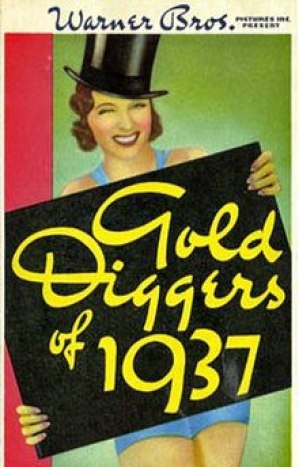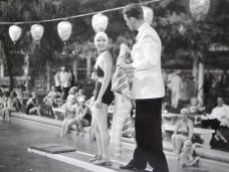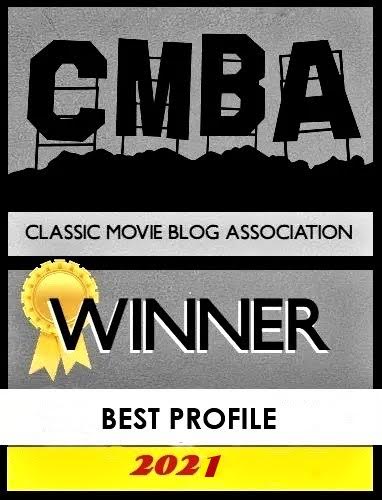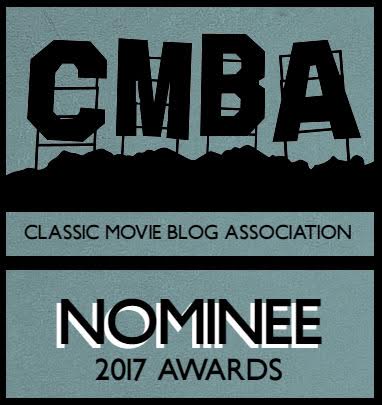
Warner Brothers continued its chain of Gold Diggers musicals after their newer installments to the series proved to be profitable. After experimenting with an original story and a brand new cast of characters with Gold Diggers of 1935 (1935), the studio made the decision to base their latest film in the series on a play called Sweet Mystery of Life by Richard Maibaum, Michael Wallach, and George Haight, which ran on Broadway for a short time in 1935. Though the story was new, several actors from previous Gold Digger films appeared in the film but as different characters, including married couple, Dick Powell and Joan Blondell.
In this film, viewers meet a hypochondriac stage producer named J.J. Hobart, who is working on a show but thinks he is going to die. His partners, Morty Wethered and Tom Hugo, lose money for the show through the stock market. Thanks to the advice of chorus girl Genevieve Larkin, they insure J.J. so that they will have the money to produce the show upon his death. Genevieve’s friend, former chorus girl Norma Perry, finds herself falling for the insurance salesman–Rosmer “Rossi” Peek. Once Rosmer’s boss finds out J.J.’s real age, he thinks that J.J. will not pass the physical. When he does, Rosmer contends that he needs to keep J.J. alive for as long as he can, in order to enjoy the rewards of the sale. However, Morty and Hugo will gain rewards with his demise. Comedy and chaos ensue as relationships develop among the characters.
The cast for this film is as follows:
- Dick Powell as Rosmer ‘Rossi’ Peek
- Joan Blondell as Norma Perry
- Glenda Farrell as Genevieve ‘Gen’ Larkin
- Victor Moore as J. J. Hobart
- Lee Dixon as Boop Oglethorpe
- Osgood Perkins as Morty Wethered
- Charles D. Brown as Mr. Tom Hugo
- Rosalind Marquis as Sally LaVerne
- Irene Ware as Irene
- William B. Davidson as Andy Callahan
- Olin Howland as Dr. MacDuffy
- Charles Halton as Dr. Bell
While Busby Berkeley directed Gold Diggers of 1935, this film is directed by Lloyd Bacon, while Berkeley supervised the musical numbers. Berkeley and Bacon had worked together previously on 42nd Street (1933). The film was produced by Jack L. Warner and Hal B. Wallis, with the screenplay by Warren Duff.
As in the previous two films, Berkeley created, designed, staged, and directed the musical numbers. In terms of the composers, Harry Warren and Al Dubin had written songs for the previous two Gold Digger films and other Warner Brothers musicals but were not slated to participate in this film. Instead, Harold Arlen and E.Y. “Yip” Harburg were to write all of the songs but Berkeley was dissatisfied with them. As a result, he brought in Warren and Dubin. While both songwriting teams contributed songs to the film, it was Warren and Dubin’s “With Plenty of Money and You (The Gold Diggers’ Lullaby)” that became the big hit number of the film.
Arlen (music) and Harburg (lyrics) contributed three numbers that made it into the film, including “Speaking of the Weather”, “Let’s Put Our Heads Together”, and “Life Insurance Song”. An additional number, “Hush Mah Mouth”, was written for the film but ultimately removed from the final print.
Warren and Dubin’s output for the film includes “With Plenty of Money and You (The Gold Diggers’ Lullaby)” and “All’s Fair in Love and War”.
In the “All’s Fair in Love and War” number, Berekely’s creative choreography shines again. The staging for this segment required 104 tap-dancing women in white military uniforms to position themselves in various military formations and geometric patterns.
Thanks to his efforts in directing the large-scale “All’s Fair in Love and War” number, Berkeley was nominated for an Academy Award for Best Dance Direction.
In reflecting upon the Gold Digger series, I feel that the “canonical” musical versions from Warner Brothers were the Gold Diggers of 1933 (1933), Gold Diggers of 1935 (1935), and Gold Diggers of 1937 installments. While this film casts Powell in the lead role with another variation on his leading lady, both Powell and Blondell execute their roles well. The two actors were already experienced in working in other installments of the Gold Diggers series, in addition to other Warner Brothers musical productions of the day, and shine as part of the studio’s top talents. Moore is also a fine addition, marking his return to the screen after two-years of starring in Anything Goes on Broadway. Farrell, too, is an exceptional supporting cast member with witty quips that make her character both practical and comical in this fun addition to the series. This film succeeds in echoing the spirit of the the previous two film versions that came before it.
Read my full series on the Gold Digger films here:


































Pingback: Gold Diggers in Paris (1938) | Hometowns to Hollywood
Pingback: Gold Diggers of 1937 (1936) | Hometowns to Hollywood
Pingback: Gold Diggers of 1935 (1935) | Hometowns to Hollywood
Pingback: Gold Diggers of 1933 (1933) | Hometowns to Hollywood
Pingback: Gold Diggers of Broadway (1929) | Hometowns to Hollywood
Pingback: The Gold Diggers (1923) | Hometowns to Hollywood
Pingback: Glenda Farrell | Hometowns to Hollywood